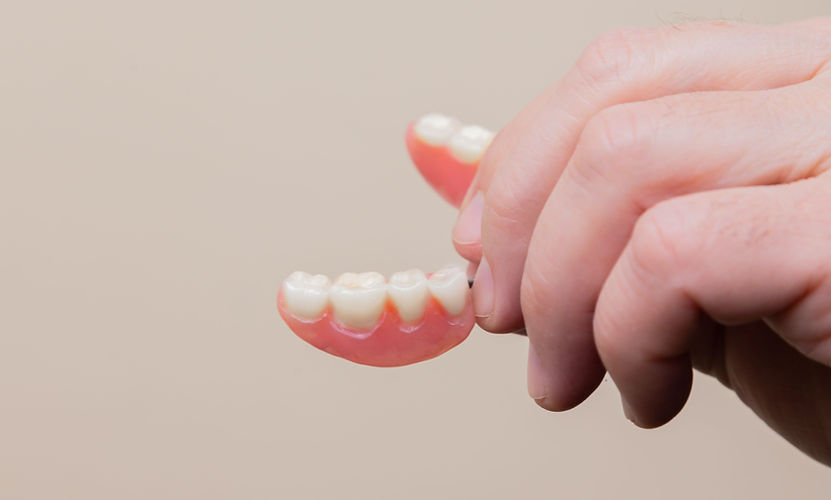
What is are Dentures?
Dentures are covered on our dental insurance policies with Bupa and Unum.
If you want to ensure that you get the best care if you need to claim for Dentures, sign up for one of our dental insurance policies today to ensure the oral health and dental hygiene of you and your employees.
Dentures are one of the most well known way to replace missing teeth and avoid the invasive treatment of dental implants. They are good way to replace multiple teeth and are based on a removable metal or plastic framework, custom made to fit your jaw.
The dentures will be fitted by your dentist taking an impression of your jaw. There is a chance that you may need additional teeth removed to ensure a good fit for your Dentures.
Do you Need Full or Partial Dentures?
Your dentist will obviously explain what you need, it all depends on how many teeth you have missing, you may have a full or partial denture.
A full denture is a removable acrylic base, or plate, which sits over the gums. On top of this sits a set of crafted acrylic teeth, which will be made to look as natural as possible. This replaces your original teeth. It will cover the roof of your mouth, so will take a while to get used to.
A partial denture is attached to the teeth either side of the gap and replaces one or a few missing teeth. They are also used as an alternative to a bridge to fill gaps in your teeth. Partial dentures may have a base plate made of plastic or metal. Those made with metal are stronger and lighter but are more expensive. A partial denture will normally have clasps that clip on to the teeth next to your denture to help to keep it in place.
What are the benefits of Dentures?
Having a good looking mouth directly affects your appearance and your self esteem, so the benefits can be immense. Not just appearance though in how you speak and eat which can make you feel more confident.
There are obvious benefits in removing decayed teeth from your mouth, in improving your overall health and preserving the life of any remaining teeth.
What are the Downsides to having Dentures?
As dentures are removable, they are not as strong and resilient as having dental implants. They cannot be considered a permanent solution. Getting used to them will take some time, so you should not expect them to be an instant solution. Talking with them initially might take some practice for more difficult words. You will also need to start carefully with what you eat, soft food only for a couple of weeks.
Dentures require good aftercare, if this isn't done, they can become brittle. You will also need regular check-ups to ensure they still fit. As you age your bone structure deteriorates which means that the Dentures may not fit correctly. If properly cared for a set of dentures should last five-eight years. If your gums start to hurt, you should contact your dentist as this may mean that they no longer fit correctly.
What are the Alternatives to Dentures?
Your dentist will advise you what is right for you, but you could also consider a bridge or dental implants. Having a comprehensive dental insurance policy in place, means that you can choose the best treatment for you rather than what you can afford.
What’s best for you depends on the number of teeth you have missing. It also depends on which teeth are missing and the condition of your remaining teeth and gums.
How to Care for Dentures
-
Take your dentures out at night, to allow your mouth to rest. Doing this can also help to prevent infections.
-
Brush, soak, then brush again. Clean your dentures after every meal using a soft toothbrush and soap or toothpaste. Make sure you clean all the surfaces of your dentures, including the areas that sit against your gums and the roof of your mouth. You can soak them in a denture cleaning solution if you wish, as this may help to remove stains. Then brush your dentures again.
-
Clean over a soft surface. Dentures might break if you drop them. It’s a good idea to clean your dentures over a soft surface or a bowl of water to ensure they don’t get broken.
-
Use the correct products. Some dentures have a soft lining. Ask your dentist for advice before you use a denture cleaning solution on this type of denture. The linings are delicate and can be damaged by cleaning solutions.
-
Don’t let them dry out. Leave your dentures in a plastic box or glass of cold water overnight so they don’t dry out.
-
Have regular check-ups. Even if you have no natural teeth left, it's still important to have regular check-ups with your dentist. Your dentist will check the fit of your dentures and look for any problem areas on your gums and soft tissue.
If you want to make sure you are covered for key dental treatment like this, please contact us today to ensure you have the dental insurance cover that you and your employees need.
Contact us today
Call us on 0800 0857 123 or submit a form for a free quote

